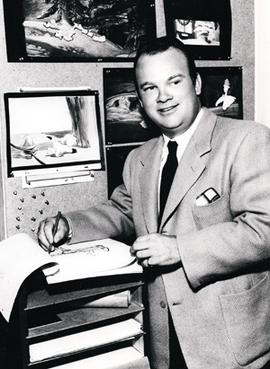
Frederick Bean "Tex" Avery was an American animator, cartoonist, director, and voice actor. He was known for directing and producing animated cartoons during the golden age of American animation. His most significant work was for the Warner Bros. and Metro-Goldwyn-Mayer studios, where he was crucial in the creation and evolution of famous animated characters such as Bugs Bunny, Daffy Duck, Porky Pig, Elmer Fudd, Droopy, Screwy Squirrel, The Wolf, Red Hot Riding Hood, and George and Junior.
The Looney Tunes Golden Collection is a series of six four-disc DVD sets from Warner Home Video, each containing about 60 Looney Tunes and Merrie Melodies animated shorts originally released from the 1930s to 1960s. The initial run of the series was in folding cardboard packaging issued gradually from October 28, 2003 to October 21, 2008. A boxed set combining all six volumes was released in 2011, and each volume was reissued separately in standard Amaray-style cases in 2020.

Elmer's Pet Rabbit is a 1941 Warner Bros. Merrie Melodies cartoon directed by Chuck Jones. The short was released on January 4, 1941, and features Elmer Fudd and Bugs Bunny.

The Heckling Hare is a Merrie Melodies cartoon, released on July 5, 1941, and featuring Bugs Bunny and a dopey dog named Willoughby. The cartoon was directed by Tex Avery, written by Michael Maltese, animated by soon-to-be director Robert McKimson, and with musical direction by Carl W. Stalling. In a style that was becoming typical of the Bugs character, he easily outwitted and tormented his antagonist through the short, his only concern being what to do next to the dog.
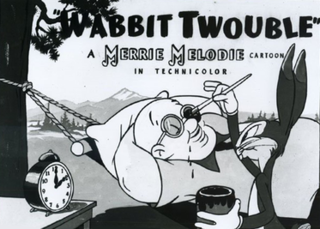
Wabbit Twouble is a Merrie Melodies cartoon starring Bugs Bunny, produced by Leon Schlesinger Productions and released on December 20, 1941, by Warner Bros. Pictures.
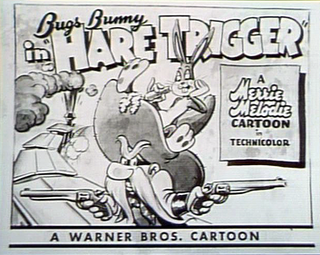
Hare Trigger is a 1945 Merrie Melodies cartoon directed by Friz Freleng. The cartoon was released on May 5, 1945, and features Bugs Bunny. The short featured the first appearance of Yosemite Sam, as well as the first short to credit (almost) the whole animation staff who worked on the short.

Looney Tunes Golden Collection: Volume 1 is a DVD box set that was released by Warner Home Video on October 28, 2003. The first release of the Looney Tunes Golden Collection DVD series, it contains 56 Looney Tunes and Merrie Melodies cartoons and numerous supplements. The set won the Classic Award at the Parents' Choice Awards.

The Old Grey Hare is a 1944 Merrie Melodies cartoon directed by Bob Clampett. The short was released on October 28, 1944, and features Bugs Bunny and Elmer Fudd.

Slick Hare is a 1947 Merrie Melodies cartoon, directed by Friz Freleng. The film was released on November 1, 1947, and features Bugs Bunny and Elmer Fudd. It parodies the Mocambo nightclub in Los Angeles—in the cartoon referred to as "The Mocrumbo". Mel Blanc voices Bugs, Arthur Q. Bryan voices Elmer Fudd and impressionist Dave Barry portrays Humphrey Bogart. The title is a pun on "hair", from an era when hair slicked down by oil was a popular fashion style for men.

The Wabbit Who Came to Supper is a 1942 Merrie Melodies cartoon featuring Bugs Bunny and Elmer Fudd. It was released on March 28, 1942, and directed by Friz Freleng.
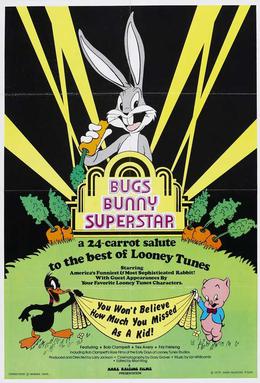
Bugs Bunny: Superstar is a 1975 Looney Tunes documentary film narrated by Orson Welles and produced and directed by Larry Jackson. It was the first documentary to examine the history of Warner Bros. Looney Tunes with its animated cartoon characters.
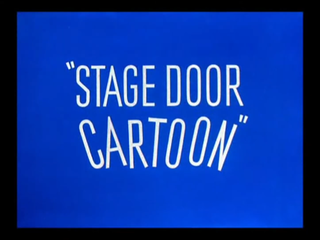
Stage Door Cartoon is a 1944 Merrie Melodies cartoon directed by Friz Freleng. The short was released on December 30, 1944, and features Bugs Bunny and Elmer Fudd.
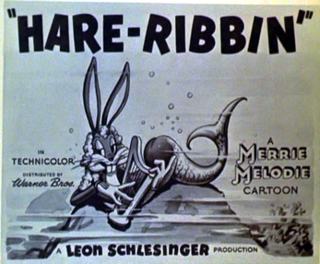
Hare Ribbin' is a 1944 animated short film in the Merrie Melodies series, directed by Robert Clampett and featuring Bugs Bunny. The plot features Bugs' conflict with a red-haired hound dog, whom the rabbit sets out to evade and make a fool of using one-liners, reverse psychology, disguises and other tricks. It was released in theaters by Warner Bros. on June 24, 1944. The title is a pun on "hair ribbon".

Person to Bunny is a 1960 Merrie Melodies animated cartoon directed by Friz Freleng. The short was released on April 1, 1960, and stars Bugs Bunny, Daffy Duck and Elmer Fudd. It is the last cartoon to feature Arthur Q. Bryan as the voice of Elmer, and was released shortly after Bryan's death.

The Hare-Brained Hypnotist is a Warner Bros. Merrie Melodies cartoon directed by Friz Freleng. The short was released on October 23, 1942 and features Bugs Bunny and Elmer Fudd. This cartoon's plot was re-worked for the cartoon Hare Brush (1955) and its opening music was re-used in Hair-Raising Hare (1946), The Super Snooper (1952) and Hyde and Hare (1955).

Hare Do is a 1949 Warner Bros. Merrie Melodies cartoon. The short was released on January 15, 1949, and stars Bugs Bunny and Elmer Fudd.

Looney Tunes Golden Collection: Volume 5 is a Looney Tunes collection on DVD. Following the pattern of one release each year of the previous volumes, it was released on October 30, 2007.
This is a listing of all the animated shorts released by Warner Bros. under the Looney Tunes and Merrie Melodies banners between 1940 and 1949.

Looney Tunes Platinum Collection: Volume 2 is a Blu-ray and DVD box set by Warner Home Video released on October 16, 2012. It contains 50 Looney Tunes and Merrie Melodies cartoons and numerous supplements. Disc 3 is exclusive to the Blu-ray version of the set. Unlike Volume 1, which was released in a digibook, Volume 2 was released in a standard 1 movie case. This release was followed by Looney Tunes Platinum Collection: Volume 3


















